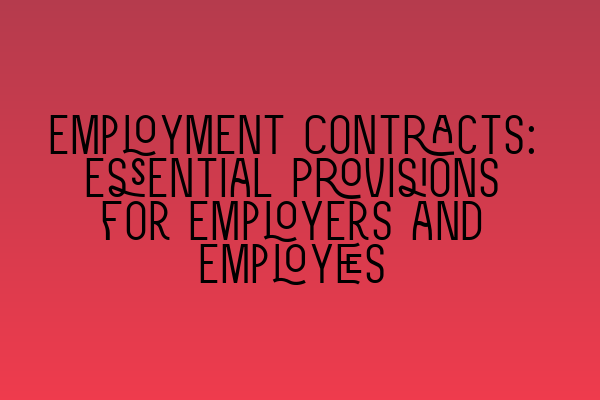Employment Contracts: Essential Provisions for Employers and Employees
In today’s fast-paced and competitive business world, it is crucial for both employers and employees to have a clear understanding of the terms and conditions of employment. This is where employment contracts come into play. Employment contracts establish the rights, responsibilities, and obligations of both parties, ensuring a transparent and mutually beneficial working relationship. In this blog post, we will delve into the essential provisions that should be included in employment contracts to protect the interests of both employers and employees.
1. Job Description and Duties
One of the fundamental aspects of any employment contract is a clear and concise job description. Employers should outline the specific duties, responsibilities, and expectations associated with the position. This clarity helps employees understand their roles within the organization and sets the foundation for performance evaluation. Employers can link the job description section to SQE 1 Practice Exam Questions to ensure that the job requirements are aligned with the necessary qualifications.
2. Compensation and Benefits
Compensation is a significant consideration for employees, and employment contracts should clearly outline the agreed-upon salary or wages. In addition to the base pay, contracts can include information about bonuses, commission structures, and any other forms of compensation. It is also important to highlight employee benefits, such as health insurance, retirement plans, vacation days, and sick leave. These provisions aid in attracting and retaining top talent within an organization. To gain a deeper understanding of employee compensation and benefits, check out SQE 1 Practice Mocks FLK1 FLK2.
3. Working Hours and Overtime
Clearly defining working hours and overtime policies helps prevent misunderstandings and disputes between employers and employees. Employment contracts should state the normal working hours and any provisions for flexible working arrangements, such as remote work or part-time schedules. It is crucial to outline the process for requesting overtime and the compensation or time-off policies associated with it. This provision ensures that both parties have a clear understanding of expectations and promotes work-life balance. For further insights on working hour regulations, consider exploring SQE 2 Preparation Courses.
4. Termination and Notice Periods
Employment contracts should clearly define the terms and conditions for termination, including notice periods for both employers and employees. This provision protects both parties and establishes a fair process for ending the employment relationship. Clearly outlining termination procedures can minimize legal implications and help manage expectations during the transitional period. Employers and employees with concerns about the termination process will benefit from reviewing SQE 1 Preparation Courses.
5. Confidentiality and Non-Disclosure Agreements
In many industries, protecting confidential information is crucial. Employment contracts should include provisions outlining the employee’s responsibility to maintain confidentiality and adhere to non-disclosure agreements. This provision ensures that sensitive information, such as trade secrets, client lists, and proprietary data, remains secure. Employers can mitigate the risk of data breaches or intellectual property theft by including this essential provision in their employment contracts.
6. Intellectual Property Rights
Innovative businesses often depend on their employees’ creation of intellectual property. Employment contracts should include provisions stating that any intellectual property developed during employment belongs to the employer. This provision protects the employer’s rights and prevents disputes over ownership of inventions, designs, or creative works.
By including these essential provisions in employment contracts, both employers and employees can establish a fair and transparent working relationship. Clear and comprehensive employment contracts promote a positive work environment, protect the interests of both parties, and contribute to overall job satisfaction. To stay informed about upcoming SQE exams and relevant dates, visit SRA SQE Exam Dates.
Remember, employment contracts are legally binding documents, and it is advisable to seek professional legal counsel when drafting or reviewing them. An experienced contract law solicitor can provide valuable guidance and ensure that your employment contracts comply with current laws and regulations. So, don’t hesitate to consult a solicitor to help protect your interests and establish a strong foundation for a successful working relationship.
